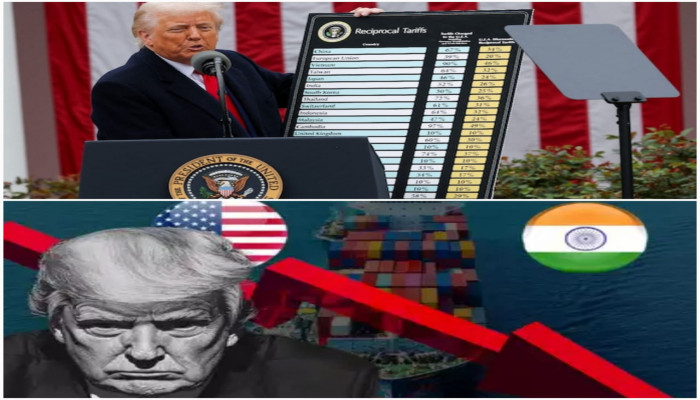Trump imposes 27% reciprocal tariff on Indian exports, calls it a 'kind' trade move
- In Reports
- 03:28 PM, Apr 03, 2025
- Myind Staff
On Wednesday (local time), U.S. President Donald Trump announced new "discounted" reciprocal tariffs on multiple countries, including India, which will now face a 27% tariff on its exports to the U.S. Describing the move as "kind reciprocal," Trump explained that these tariffs would not be fully equal but would amount to roughly half of the levies those countries impose on U.S. goods. During a press conference at the White House, Trump presented a chart listing the affected countries, including India, along with the new tariffs and the existing duties those nations impose on American imports. He pointed out that India currently imposes a 52% tariff on U.S. goods.
Citing Reuters, a senior White House official confirmed that the new tariffs will take effect on April 9 at 12:01 a.m. While recalling Prime Minister Narendra Modi’s visit to the U.S. in February, Trump referred to him as a "great friend" but argued that India has not treated the U.S. fairly due to its "very tough" tariffs.
"The Prime Minister just left. He's a great friend of mine. But I said, 'You're a friend of mine, but you haven't been treating us right'. They charge us 52 per cent, but we charged them almost nothing for years and decades. It was only seven years ago when I came in," he expressed.
The US President has introduced a sweeping trade policy, imposing a minimum 10% tariff on all imports. However, countries with significant trade deficits with the US will face even higher tariffs, ranging from 10% to a whopping 49% in the case of Cambodia.
"If you want your tariff rate to be zero, build your products in America. Else, foreign countries will be asked to pay tariffs to access the US market," he stated. "In many cases, the friend is worse than the foe in terms of trade. Trade deficits are no longer merely an economic problem. They are a national emergency. We are finally putting America first," he further stated.
Trump announced that starting April 3, a 25% tariff will be imposed on automobiles not assembled in the United States. This decision could result in higher prices for vehicles manufactured outside the country.
Trump stated that U.S. taxpayers had been "ripped off for more than 50 years" and described the reciprocal tariffs as a "declaration of economic independence" for the country. "For years, hardworking American citizens were forced to sit on the sidelines as other nations got rich and powerful, much of it at our expense. But now it's our turn to prosper. Tariffs are going to give us growth," he stated.
He reiterated his stance, "It's our declaration of economic independence. Taxpayers have been ripped off for more than 50 years. But it is not going to happen anymore." Trump, who referred to April 2 as 'Liberation Day' for the U.S. regarding imports and exports, described his tariff policy as "kind reciprocal," noting that he could have imposed even harsher measures on U.S. trading partners. However, he acknowledged that it would be "tough for a lot of countries."
The U.S. President announced that the country will impose a 34% tax on imports from China, 20% on imports from the European Union, 25% on South Korea, 24% on Japan, and 32% on Taiwan. After making this announcement, Trump signed an executive order to implement the reciprocal tariffs.
Trump’s announcement on reciprocal tariffs means that certain Indian exports will face higher import duties, causing traders to be concerned about the potential impact on export-driven industries. However, a report from SBI Research suggests that India is unlikely to be significantly affected. The report estimates that U.S. tariffs may result in only a 3-3.5% decline in exports. Additionally, India’s expanding exports in manufacturing and services are expected to offset the impact of these tariffs.
SBI Research highlighted that India has broadened its export portfolio, enhanced value addition, and is restructuring supply chains by establishing new trade routes, including a corridor connecting Europe to the U.S. via the Middle East.
Before reciprocal tariffs were announced, Commerce and Industry Minister Piyush Goyal visited Washington earlier this month to discuss a potential bilateral trade agreement (BTA) and explore tariff exemptions. Both countries are working toward finalising a trade deal by the end of the year, with a long-term goal of increasing bilateral trade to USD 500 billion by 2030.







Comments